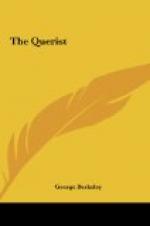280. Qu. Whether any man hath a right to judge, that will not be at the pains to distinguish?
281. Qu. Whether there be not a wide difference between the profits going to augment the national stock, and being divided among private sharers? And whether, in the former case, there can possibly be any gaming or stock-jobbing?
282. Qu. Whether it must not be ruinous for a nation to sit down to game, be it with silver or with paper?
283. Qu. Whether, therefore, the circulating paper, in the late ruinous schemes of France and England, was the true evil, and not rather the circulating thereof without industry? And whether the bank of Amsterdam, where industry had been for so many years subsisted and circulated by transfers on paper, doth not clearly decide this point?
284. Qu. Whether there are not to be seen in America fair towns, wherein the people are well lodged, fed, and clothed, without a beggar in their streets, although there be not one grain of gold or silver current among them?
285. Qu. Whether these people do not exercise all arts and trades, build ships and navigate them to all parts of the world, purchase lands, till and reap the fruits of them, buy and sell, educate and provide for their children? Whether they do not even indulge themselves in foreign vanities?
286. Qu. Whether, whatever inconveniences those people may have incurred from not observing either rules or bounds in their paper money, yet it be not certain that they are in a more flourishing condition, have larger and better built towns, more plenty, more industry, more arts and civility, and a more extensive commerce, than when they had gold and silver current among them?
287. Qu. Whether a view of the ruinous effects of absurd schemes and credit mismanaged, so as to produce gaming and madness instead of industry, can be any just objection against a national bank calculated purely to promote industry?
288. Qu. Whether a scheme for the welfare of this nation should not take in the whole inhabitants? And whether it be not a vain attempt, to project the flourishing of our Protestant gentry, exclusive of the bulk of the natives?
289. Qu. Whether, therefore, it doth not greatly concern the State, that our Irish natives should be converted, and the whole nation united in the same religion, the same allegiance, and the same interest? and how this may most probably be effected?
290. Qu. Whether an oath, testifying allegiance to the king, and disclaiming the pope’s authority in temporals, may not be justly required of the Roman Catholics? And whether, in common prudence or policy, any priest should be tolerated who refuseth to take it?
291. Qu. Whether there have not been Popish recusants? and, if so, whether it would be right to object against the foregoing oath, that all would take it, and none think themselves bound by it?




